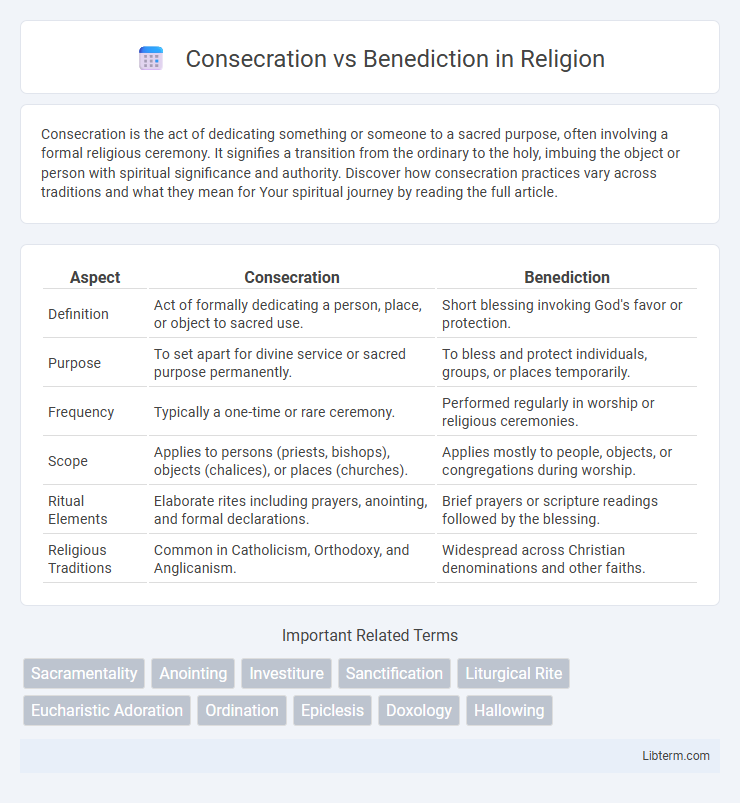Consecration is the act of dedicating something or someone to a sacred purpose, often involving a formal religious ceremony. It signifies a transition from the ordinary to the holy, imbuing the object or person with spiritual significance and authority. Discover how consecration practices vary across traditions and what they mean for Your spiritual journey by reading the full article.
Table of Comparison
| Aspect | Consecration | Benediction |
|---|---|---|
| Definition | Act of formally dedicating a person, place, or object to sacred use. | Short blessing invoking God's favor or protection. |
| Purpose | To set apart for divine service or sacred purpose permanently. | To bless and protect individuals, groups, or places temporarily. |
| Frequency | Typically a one-time or rare ceremony. | Performed regularly in worship or religious ceremonies. |
| Scope | Applies to persons (priests, bishops), objects (chalices), or places (churches). | Applies mostly to people, objects, or congregations during worship. |
| Ritual Elements | Elaborate rites including prayers, anointing, and formal declarations. | Brief prayers or scripture readings followed by the blessing. |
| Religious Traditions | Common in Catholicism, Orthodoxy, and Anglicanism. | Widespread across Christian denominations and other faiths. |
Understanding Consecration and Benediction
Consecration is the solemn dedication of a person, object, or place to a sacred purpose, often involving a formal religious ceremony and the invocation of divine blessing. Benediction refers specifically to a short blessing given, usually at the end of a worship service, to invoke God's favor and protection on the congregation. Understanding consecration involves recognizing its role in sanctifying and setting apart, while benediction serves as a concluding prayer to affirm God's grace.
Historical Origins of Consecration and Benediction
Consecration traces its historical origins to ancient religious rites, where objects, people, or places were solemnly dedicated to sacred service, often seen in early Jewish and Christian traditions. Benediction originated later as a liturgical blessing practice in the medieval Church, emphasizing the invocation of divine favor, frequently associated with the blessing of the Eucharist during Mass. Both practices reflect evolving theological understandings and ritual developments within Christianity, with Consecration primarily signifying sanctification and Benediction focusing on imparting blessings.
Definitions: Consecration vs Benediction
Consecration is the solemn dedication of a person, place, or object to a sacred purpose, often involving a formal religious ceremony that imparts holiness and sets it apart for divine use. Benediction is a short invocation or blessing pronounced by a clergy member, typically at the end of a worship service, seeking divine favor or protection. While consecration establishes a permanent sacred status, benediction serves as a momentary expression of blessing and grace.
Key Differences Between Consecration and Benediction
Consecration involves the formal dedication of a person, place, or object to a sacred purpose, often through a solemn religious ceremony, signifying permanent sanctification. Benediction refers to a blessing, typically a short invocation or prayer requesting divine favor, commonly bestowed during liturgical services or at their conclusion. The key difference lies in consecration's irreversible sanctification contrasted with benediction's temporary or specific invocation of grace.
Religious Contexts and Practices
Consecration in religious contexts involves the solemn dedication of an object, place, or person to a divine purpose, often marked by specific rituals and prayers to set it apart from the secular. Benediction refers to the act of imparting a blessing, typically given by clergy, invoking divine favor or protection upon individuals or congregations during liturgical ceremonies. Both practices play essential roles in worship, with consecration establishing sacredness and benediction offering spiritual grace and encouragement.
Theological Significance of Both Rites
Consecration is a sacred act that dedicates a person, object, or place entirely to divine service, symbolizing a permanent, holy transformation recognized in many Christian traditions. Benediction involves a liturgical blessing, often with the Blessed Sacrament, meant to invoke God's grace and protection, reflecting a momentary sanctification rather than a lifelong commitment. Both rites emphasize divine interaction, with consecration establishing enduring holiness and benediction providing spiritual enrichment and encouragement to the faithful.
Rituals and Symbolism Involved
Consecration involves a solemn ritual that sets a person, object, or place apart as sacred, often symbolized by anointing with holy oil and specific prayers invoking divine presence. Benediction, typically a blessing at the end of a religious service, features the raising of the Eucharist or a sacred element, accompanied by chants and the sign of the cross, symbolizing divine favor and protection. Both rituals use tangible symbols like candles, incense, and vestments, reinforcing the spiritual significance and connection to the divine within Christian liturgical traditions.
Consecration in Various Faith Traditions
Consecration in various faith traditions involves the formal dedication of persons, objects, or places to a sacred purpose, symbolizing purification and sanctification in rites such as Christian altar consecration, Hindu temple dedication, and Jewish Torah scroll consecration. This ritual often includes prayers, anointing with holy oils, and the invocation of divine presence to set apart the consecrated entity from the profane to the sacred. In contrast, benediction primarily serves as a blessing or invocation for divine favor, typically performed without the comprehensive dedicatory rites characteristic of consecration ceremonies.
Benediction in Modern Worship
Benediction in modern worship serves as a solemn blessing given by a clergy member to conclude a service, emphasizing peace, grace, and spiritual protection for the congregation. Unlike consecration, which dedicates people or objects to a sacred purpose, benediction focuses on invoking divine favor and encouragement. Contemporary worship practices often incorporate benediction to reinforce communal faith and provide a meaningful spiritual send-off.
Choosing Between Consecration and Benediction
Choosing between consecration and benediction depends on the desired spiritual focus and setting. Consecration involves dedicating a person, place, or object to a sacred purpose with a profound, often permanent, commitment in religious ceremonies. Benediction serves as a blessing, typically invoking divine favor or protection, commonly used at the conclusion of worship or special events to offer grace and encouragement.
Consecration Infographic

 libterm.com
libterm.com